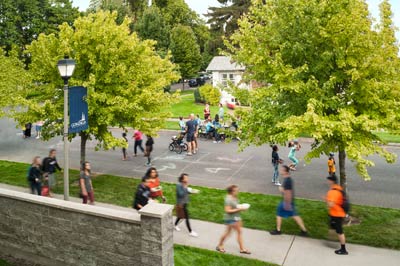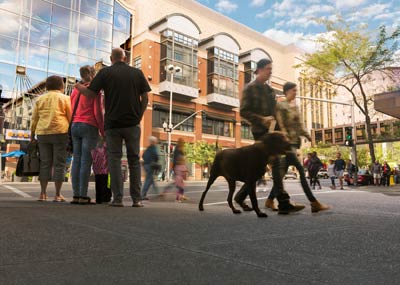The six founding partners of Urbanova, the newly-named smart city living lab in Spokane, Washington, announced last month the formalization of their collaboration. The group signed a memorandum of understanding to align their efforts around a shared vision and purpose for the project. For more than two years, the partners, including Avista, the City of Spokane, Itron, McKinstry, the University District Development Association and Washington State University (WSU), have been working to create a living laboratory to design cities of the future in the 770-acre University District, adjacent to Spokane’s downtown core.
Urbanova’s goal is to harness data to gain insights, empower people and solve urban challenges in new ways. It will enable healthier citizens, safer neighborhoods, smarter infrastructure, a more sustainable environment and a stronger economy. The collaborative effort is already yielding results with smart city projects, including a smart and connected streetlight pilot, “Shared Energy Economy” model and smart city research grants.
“Urbanova has seen tremendous progress this year. As new technologies continue to change the energy landscape, Avista is proud to be one of the founding partners to come together to create a smart city technology proving ground that anyone can utilize and that everyone will benefit from — in the heart of Spokane,” said Heather Rosentrater, Avista vice president of energy delivery. “Each partner brings expertise and leadership in their respective fields. Aligning our efforts will support projects that can enhance the livability, workability, sustainability and quality of life in cities, starting with Spokane. It will also create a testing ground for companies and innovators who are working on smart city solutions to be replicated around the world.”
“The City of Spokane and its citizens will greatly benefit from Urbanova’s mission as it aims to improve the economy, environment and well-being of our community. In the future, cities will address issues like resource scarcity, traffic, safety and health through the use of technology. Local businesses and residents will want to be involved in this exciting work,” said City of Spokane Mayor David Condon.
Here’s a closer look at several of our proof points of success to date:
Smart and Connected Streetlight Pilot
The smart and connected streetlight pilot is the first of Urbanova’s smart city projects and central to its participation in Envision America’s yearlong technical support program. The pilot aims to intelligently manage and control streetlights to increase energy efficiency, among other goals. The pilot will also feature a human-scale urban air quality R&D component, measuring the quality of the air at different sensor points throughout the district and assessing its role in a healthy city.
The pilot will play a key role in helping define how to develop and design a living laboratory, from establishing a data governance platform to understanding how to architect a shared platform, while also working through issues, such as who owns the data, who controls it and how it is shared.
Shared Energy Economy Model Pilot
Avista was recently awarded a grant from the Washington Department of Commerce and Governor Jay Inslee’s Clean Energy Fund to demonstrate how a Shared Energy Economy can benefit Washington energy consumers. As part of the grant, Avista will work with several partners to pilot a Shared Energy Economy model in the University District. Avista’s partners in this endeavor include, UniEnergy Technologies, McKinstry, Schweitzer Engineering Laboratories, Pacific Northwest National Laboratory, the U.S. Department of Energy, Washington State University and technology partner Itron.
The Shared Energy Economy model will allow various energy assets — from solar panels and battery storage to traditional utility assets — to be shared and used for multiple purposes, including system efficiency and grid resiliency. By doing this, Avista and partners will demonstrate how both the consumer and utility can benefit.
Smart City Research Grant
Researchers in the WSU Voiland College of Engineering and Architecture are leading a five-year, $1.5 million initiative to develop a framework to monitor, predict and control energy and air quality in an urban environment and to record resulting health impacts in Spokane’s University District.
Funded by Washington State University (WSU), the multi-disciplinary initiative is part of WSU’s Grand Challenges in smart systems, which aims to harness technology to improve quality of life. The initiative will link researchers in WSU’s Energy Systems Innovation Center, the Laboratory for Atmospheric Research and the Institute for Sustainable Design with Urbanova and its public and private sector partners. The initiative will help build capacity within WSU to pursue smart city solutions and funding.
In addition, Urbanova partners have applied for several other grants and opportunities to catalyze initial efforts.
“Itron knows from our experience working with smart city initiatives around the globe that the proving ground in Spokane is a valuable resource and essential for the effective development of smart city solutions that are scalable and replicable,” said Sharelynn Moore, vice president of global marketing and public affairs at Itron. “Cities across the globe are working to use technology in new ways to help improve services and infrastructure for citizens and to help address urban challenges like energy and water usage, traffic, waste and citizen engagement. Urbanova is an innovator in this effort.”
Interested in learning more? Join us. We’d like to continue the conversation. Visit www.urbanova.org
About Urbanova
The Urbanova is a living laboratory to design cities for the future. Located in the University District, we harness data to gain insights, empower people and solve urban challenges in new ways. We enable healthier citizens, safer neighborhoods, smarter infrastructure, a more sustainable environment and a stronger economy. www.urbanova.org








